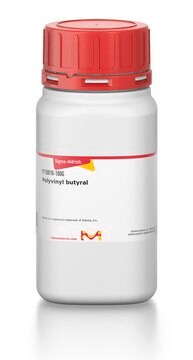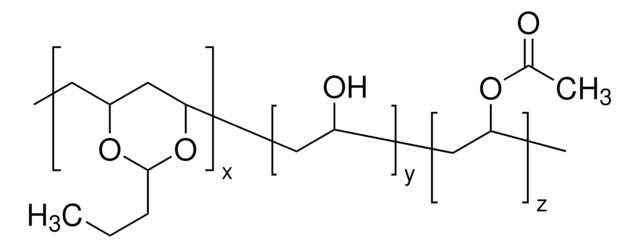189480
Poly(vinyl acetate)
average Mw ~100,000 by GPC, beads
Synonym(s):
Polyvinyl acetate
Sign Into View Organizational & Contract Pricing
All Photos(3)
About This Item
Linear Formula:
[CH2CH(O2CCH3)]n
CAS Number:
MDL number:
UNSPSC Code:
12162002
PubChem Substance ID:
NACRES:
NA.23
Recommended Products
form
beads
Quality Level
mol wt
average Mw ~100,000 by GPC
viscosity
17-21 sec.(25 °C, Ford, no. 4)(lit.)
density
1.18 g/mL at 25 °C
storage temp.
2-8°C
SMILES string
COC(=O)C=C
InChI
1S/C4H6O2/c1-3-6-4(2)5/h3H,1H2,2H3
InChI key
XTXRWKRVRITETP-UHFFFAOYSA-N
Looking for similar products? Visit Product Comparison Guide
General description
Poly(vinyl acetate) (PVAc) is a non-crystalline, atactic polymer. It is prepared from vinylacetate monomer via free radical polymerization. It is commonly usedin the food industry due to its low toxicity and excellent flexibility. PVAc films are used as emission sensors forvehicles and in oral drug delivery products.
Application
Poly(vinyl acetate) can be used as a:
- Starting material to prepare polymer fibers for gas and humidity sensor applications. Citric acid-doped PVAc nanofibrous mats can be used to develop sensors for trimethylamine gas at room temperature.
- Polymer coating for floating tablets showing a controlled drug delivery. PVAc is a suitable excipient to ensure reliable and safe drug release. PVAc-based matrix tablet flow due to intrinsic low density and high elasticity of polyvinyl acetate coating.
Storage Class Code
11 - Combustible Solids
WGK
nwg
Flash Point(F)
Not applicable
Flash Point(C)
Not applicable
Personal Protective Equipment
dust mask type N95 (US), Eyeshields, Gloves
Choose from one of the most recent versions:
Certificates of Analysis (COA)
Lot/Batch Number
Don't see the Right Version?
If you require a particular version, you can look up a specific certificate by the Lot or Batch number.
Already Own This Product?
Find documentation for the products that you have recently purchased in the Document Library.
Customers Also Viewed
Cellulose nanofibrils/polyvinyl acetate nanocomposite adhesives with improved mechanical properties.
Ons Chaabouni et al.
Carbohydrate polymers, 156, 64-70 (2016-11-16)
Cellulose nanofibrils (CNFs) are nanoscale cellulose produced from renewable resources with strong reinforcing potential when included in a polymer matrix. In this work, the effect of the addition of CNFs on the properties of waterborne polyvinylacetate (PVA) adhesive was investigated.
K Kolter et al.
International journal of pharmaceutics, 457(2), 470-479 (2013-10-01)
Polyvinyl acetate-based colloidal aqueous polymer dispersion Kollicoat(®) SR 30 D results in coatings characterized by moderate swelling behaviour, lipophilicity, pH-independent permeability for actives and high flexibility to withstand mechanical stress and is therefore used for controlled release coating. The colloidal
Seon Tae Kim et al.
International journal of pediatric otorhinolaryngology, 77(1), 113-116 (2012-11-08)
The purpose of this prospective study was to determine the effectiveness of polyurethane foam (PUF) and polyvinyl acetate (PA) as packing materials for reducing post-conchotomy bleeding, pain, and headaches. This study was a prospective, randomized and single-blinded controlled study. Fifty-two
Priscileila Colerato Ferrari et al.
Carbohydrate polymers, 91(1), 244-252 (2012-10-10)
In this work pellets containing chitosan for colonic drug delivery were developed. The influence of the polysaccharide in the pellets was evaluated by swelling, drug dissolution and intestinal permeation studies. Drug-loaded pellets containing chitosan as swellable polymer were coated with
Dae Woo Kim et al.
American journal of rhinology & allergy, 26(5), e147-e149 (2012-11-22)
This study investigated the efficacy of glove finger-coated polyvinyl acetate (PA) pack on hemostasis, pain levels, and wound healing after endoscopic sinus surgery (ESS). A prospective, randomized, double-blinded controlled study was performed in 30 patients who underwent bilateral ESS for
Our team of scientists has experience in all areas of research including Life Science, Material Science, Chemical Synthesis, Chromatography, Analytical and many others.
Contact Technical Service






